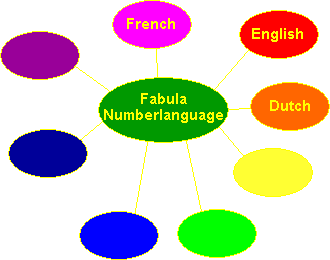 |
 |
 |
 |
 |
 |
 |
 |
 |
 |
Other ideas Fabc  |
|||||||||

Give every mobile phone such a number-language database!
In order to make reasonable translations, not only of words but of sentences as well, one also needs a short program for every language, with grammatical rules.
The idea is to arrange the words of a language (English to start with) sort by sort, to give every word a number, and to place numbers and words in a database. The database then easily can be extended with other languages.
In the example below, the number of words is only 10,000 (0 - 9999). So we first have to select the most often used words in ordinary conversation and communication. A larger database of course also is possible.
| Number | English | Dutch | French |
| 0 | it | het | il |
| 1 | I | ik | je |
| 0 - 9 | Personal words like you, he, they, I, it. | ||
| 10 - 99 | Relational words like and, with, or, on, his, her. | ||
| 11 | my | mijn | ma mon |
| 25 | on | op | en sur dans |
| 100 - 999 | Verbs and their declensions. | ||
| 360 | to cycle | fietsen | aller (en vélo) |
| 361 | (I) cycle | (ik) fiets | (je) va (en vélo) |
| 1000 - 9999 | Nouns and other names of things and properties. | ||
| 2360 | wheel | wiel | roue |
| 2361 | bike bicycle | fiets rijwiel | bicyclette vélo |
| 7100 | color | kleur | couleur |
| 7101 | white | wit | blanc blanche |
It even is possible to write directly in numberlanguage, and to learn to read it (1 361 25 11 2361 = I cycle on my bicycle; 2 362 25 12 2361 = You cycle on your bicycle).
The division and subdivision of words in sorts, is the grammar of the numberlanguage.
The fact that the numberlanguage consists of 1 letter words (0 - 9), 2 letter words (10 - 99), 3 letter words (100 - 999) and 4 letter words (1000 - 9999) can also be used to create order. In the example above, the 3 letter words are verbs and their declensions, the 4 letter words are nouns and other names of things and their properties.
The nouns and other names of things, properties and qualities can be arranged sort by sort, so all living creatures together in a list, subdivided in plants, animals et cetera, again subdivided in mammals, fishes, birds et cetera; all colors together et cetera.
Signs like . , ? ! @ % + et cetera do not need translation.
If an English (or other) sentence contains a number itself (100 kilometer), then, in the numberlanguage, a sign must be written before the number, #100 for example.
A whole numberlanguage word, no matter how long the English (French, Dutch) word is, then only is one number, and therefore only needs 2 bytes to store it in computer memory. So, a numberlanguage message is very fast.
Jan Helderman
24-3-4
